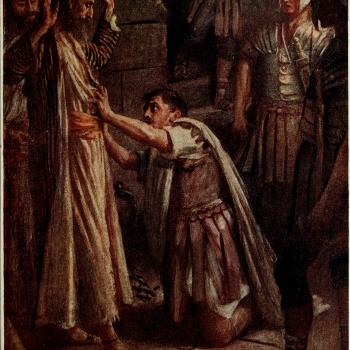Tim Challies writes positively about David Platt’s new book, Counter Culture:
[Platt] begins with the gospel. He believes that the gospel is meant to compel the Christian to take action, saying “the gospel is the lifeblood of Christianity, and it provides the foundation for countering culture. For when we truly believe the gospel, we begin to realize that the gospel not only compels Christians to confront social issues in the culture around us. The gospel actually creates confrontation with the culture around—and within—us.” The gospel creates confrontation through its most outlandish and offensive claim:
[T]the most offensive and countercultural claim in Christianity is not what Christians believe about homosexuality or abortion, marriage or religious liberty. Instead, the most offensive claim in Christianity is that God is the Creator, Owner, and Judge of every person on the planet. Every one of us stands before him guilty of sin, and the only way to be reconciled to him is through faith in Jesus, the crucified Savior and risen King. All who trust in his love will experience everlasting life while all who turn from his lordship will suffer everlasting death.
On the positive side, at least Challies and Platt recognize some at-odds-ness to the relationship between Christianity and culture, which is a breath of fresh air compared to the standard transformation-of-culture meme that oozes out of hipster Christianity and various evangelical plans for church growth.
But on the other hand, can anyone explain to me where the Bible even talks about culture or whether Christians are supposed to be engaged in building one? If you do a search at the ESV website for culture or civilization, you net zero hits. Of course, you may want to claim that the Old Testament Israelites lived in a redeemed culture and so provide a model for arguing that cult is the basis of culture. But it is hard to find in the Old Testament a plan for using redemption to civilize other peoples and lands. Israel’s culture seems to be based far more on setting God’s people apart rather than providing a blueprint for how to make culture. And don’t forget that the apostle Paul recommended quiet and peaceful lives to his converts. (1 Tim 2:2)
In addition to having slim biblical support, the idea of a Christian culture loses the remarkable flexibility that Christianity encouraged among its followers, at least as recorded in the Letter to Diognetus:
For Christians cannot be distinguished from the rest of the human race by country or language or customs. They do not live in cities of their own; they do not use a peculiar form of speech; they do not follow an eccentric manner of life. This doctrine of theirs has not been discovered by the ingenuity or deep thought of inquisitive men, nor do they put forward a merely human teaching, as some people do. Yet, although they live in Greek and barbarian cities alike, as each man’s lot has been cast, and follow the customs of the country in clothing and food and other matters of daily living, at the same time they give proof of the remarkable and admittedly extraordinary constitution of their own commonwealth. They live in their own countries, but only as aliens. They have a share in everything as citizens, and endure everything as foreigners. Every foreign land is their fatherland, and yet for them every fatherland is a foreign land. They marry, like everyone else, and they beget children, but they do not cast out their offspring. They share their board with each other, but not their marriage bed. It is true that they are “in the flesh,” but they do not live “according to the flesh.” They busy themselves on earth, but their citizenship is in heaven. They obey the established laws, but in their own lives they go far beyond what the laws require. They love all men, and by all men are persecuted. They are unknown, and still they are condemned; they are put to death, and yet they are brought to life. They are poor, and yet they make many rich; they are completely destitute, and yet they enjoy complete abundance. They are dishonored, and in their very dishonor are glorified; they are defamed, and are vindicated. They are reviled, and yet they bless; when they are affronted, they still pay due respect. When they do good, they are punished as evildoers; undergoing punishment, they rejoice because they are brought to life. They are treated by the Jews as foreigners and enemies, and are hunted down by the Greeks; and all the time those who hate them find it impossible to justify their enmity.
By constantly talking about culture, whether creating a Christian one or opposing a hostile one, I worry that evangelicals lend support to the impulse that led western Christians to think they could drive Muslims and Jews out of holy and not-so-holy lands.












